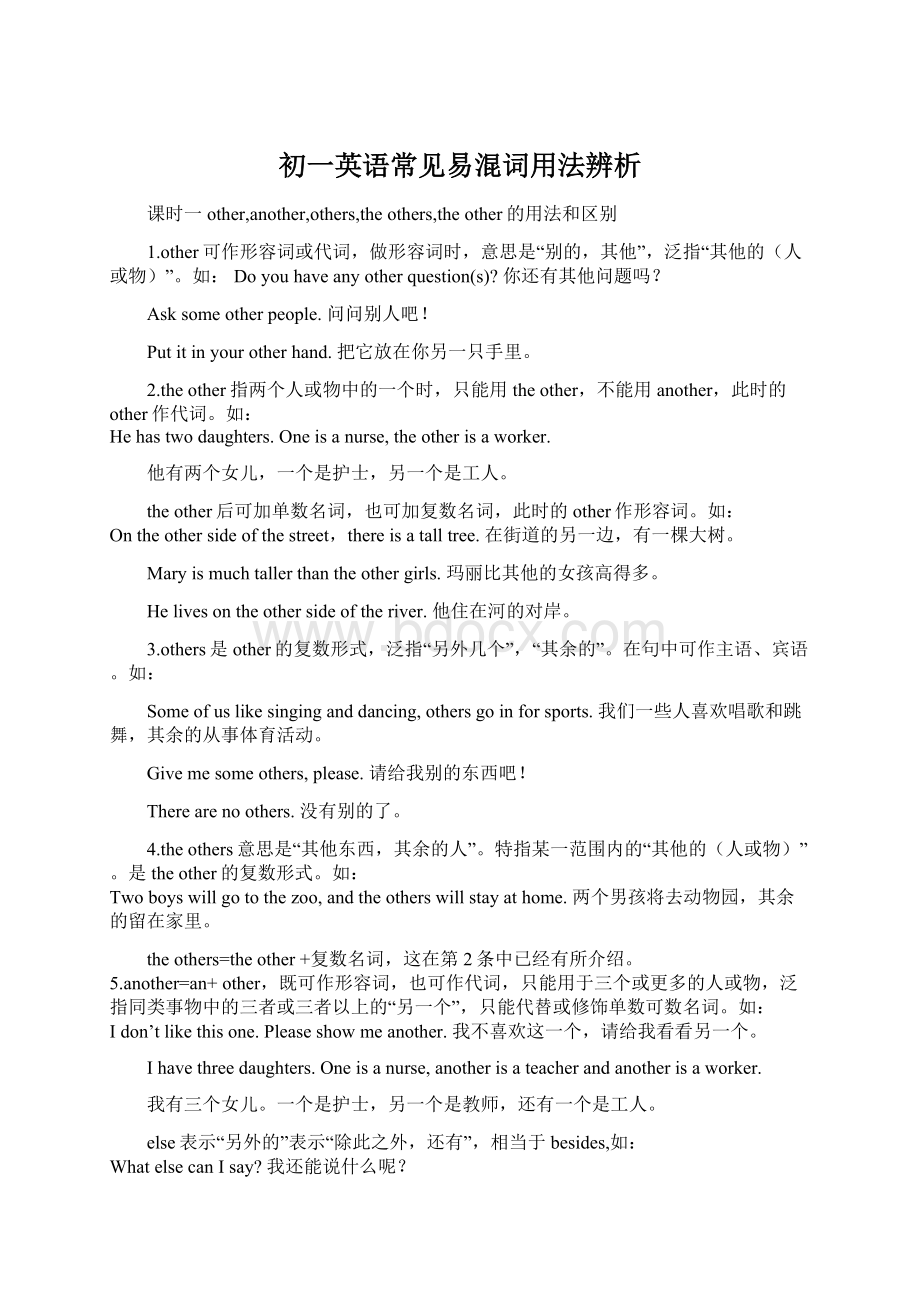初一英语常见易混词用法辨析.docx
《初一英语常见易混词用法辨析.docx》由会员分享,可在线阅读,更多相关《初一英语常见易混词用法辨析.docx(16页珍藏版)》请在冰豆网上搜索。

初一英语常见易混词用法辨析
课时一other,another,others,theothers,theother的用法和区别
1.other可作形容词或代词,做形容词时,意思是“别的,其他”,泛指“其他的(人或物)”。
如:
Doyouhaveanyotherquestion(s)?
你还有其他问题吗?
Asksomeotherpeople.问问别人吧!
Putitinyourotherhand.把它放在你另一只手里。
2.theother指两个人或物中的一个时,只能用theother,不能用another,此时的other作代词。
如:
Hehastwodaughters.Oneisanurse,theotherisaworker.
他有两个女儿,一个是护士,另一个是工人。
theother后可加单数名词,也可加复数名词,此时的other作形容词。
如:
Ontheothersideofthestreet,thereisatalltree.在街道的另一边,有一棵大树。
Maryismuchtallerthantheothergirls.玛丽比其他的女孩高得多。
Helivesontheothersideoftheriver.他住在河的对岸。
3.others是other的复数形式,泛指“另外几个”,“其余的”。
在句中可作主语、宾语。
如:
Someofuslikesinginganddancing,othersgoinforsports.我们一些人喜欢唱歌和跳舞,其余的从事体育活动。
Givemesomeothers,please.请给我别的东西吧!
Therearenoothers.没有别的了。
4.theothers意思是“其他东西,其余的人”。
特指某一范围内的“其他的(人或物)”。
是theother的复数形式。
如:
Twoboyswillgotothezoo,andtheotherswillstayathome.两个男孩将去动物园,其余的留在家里。
theothers=theother+复数名词,这在第2条中已经有所介绍。
5.another=an+other,既可作形容词,也可作代词,只能用于三个或更多的人或物,泛指同类事物中的三者或三者以上的“另一个”,只能代替或修饰单数可数名词。
如:
Idon’tlikethisone.Pleaseshowmeanother.我不喜欢这一个,请给我看看另一个。
Ihavethreedaughters.Oneisanurse,anotherisateacherandanotherisaworker.
我有三个女儿。
一个是护士,另一个是教师,还有一个是工人。
else表示“另外的”表示“除此之外,还有”,相当于besides,如:
WhatelsecanIsay?
我还能说什么呢?
1 She has two sons, ___is a teacher, _____is an engineer
A one, the other Bone, another C another, another Done, other
2You have seen one of the photos of my sisters, now I’ll show you___
A another B other C others D the others
3__went to the great wall, ___visited the Miyun
A Any, other B One, other C Some others D Some the others
4 Have you any ____ novels?
A another B other C others D the other
5 Would you like to have___ cup of tea?
A another B other C others D the other
6The t-shirt is too long, please show me___
A another B other C others D the other
7He is able to do the work without _____help
A the other’s B others’ C any others’ D other
8We can do it __time
A another B other C others D the other
9There are four dictionaries on the bookshelf. one is French, ___are English
A another B other C others D the others
10The children don’t like this story, please tell them___
A another Bthe other Cothers D the others
11These cups are ours,those are___
A others B others’ C other’s D the others’
12China is larger than _____countries in Europe
AotherBothersCanyotherCanyothers
13If you want to change a double room, you’ll have to pay ___$15.
A another B other C others D the other
课时八频度副词
1.定义usually/sometimes/always/often等词在英文中被称为“频度副词”,是用来表示动作频率的,但程度上有别。
常见频度副词按频率大小排列如下:
always(100%)>usually(80%)>often(60%)>sometimes(40%)>seldom(20%)>never(0%)
2.频度副词的位置
◆频度副词在句中习惯上位于be动词、助动词等之后,行为动词之前。
1.在be动词之后。
如:
Sheissometimesverybusy.她有时很忙。
2.在第一个助动词或情态动词之后。
如:
Iwillneverforgetthislesson.我将永远忘不了这一课。
3.在实义动词之前。
如:
Weoftengothere.我们常去那儿。
◆sometimes也可放在句首、句中或句末,often也可放在句末(一般不放在句首)。
如:
Sometimesshewritestome.=Shewritestomesometimes.
她有时候给我写信。
Shewritestomeoften.她经常给我写信。
◆如果有两个助动词,频度副词通常放在第一个助动词后面。
如:
Wehaveneverbeeninvitedtooneoftheirparties.他们聚会,一次也没邀请过我们。
Shemustsometimeshavewantedtorunaway.她有时候一定想到过要逃走。
3.频度副词的用法
◆always频率最高,表示动作重复、状态继续,表示“一直、总是”,其反义词为never。
always等与not连用时,表示部分否定。
如:
Thericharenotalwayshappy.有钱的人并不总是快乐的。
如果要变为否定句,应将always改为never才能全部否定。
如:
LiPingisalwayslateforschool.李平上学总是迟到。
LiPingisneverlateforschool.李平上学从不迟到。
(全部否定)
LiPingisnotalwayslateforschool.李平上学不总是迟到。
(部分否定)
频度副词通常和一般现在时连用,表示动作发生的频率。
但always与进行时连用时,并不强调动作正在进行,而是表示赞叹、厌烦等情绪。
如:
Heisalwaysthinkingofothers.他总是想着别人。
(赞叹)
Sheisalwaysaskingsillyquestions.她总是问些愚蠢的问题。
(厌烦)
Theboyisalwaysaskingformoney.这个小男孩总是要钱。
(厌烦)
◆usually意为“通常”,表示习惯性动作或状态,很少有例外。
如:
Weusuallygotoschoolatseveninthemorning.我们通常在早上七点上学。
MymotherandIusuallygoshoppingonSundays.我和妈妈通常在星期天去买东西。
◆Often意为“经常,时常”,表示反复性的动作或状态,中间有间断,不如usually那么频繁。
其反义词是seldom。
often在句尾时常被very或quite修饰。
如:
ItoftenrainshereinApril.这儿四月份常下雨。
heboysofteneatnoodlesandthegirlssometimeseatthem.男生经常吃面条,女生有时吃。
Ioftenchatwithmyfriendsunderthebigtree.我经常在这棵大树下和朋友聊天。
Hewritestohisfriendsquiteoften.他常给他的朋友写信。
◆sometimes意为“有时”,频率不及often,表示动作偶尔发生,间断时间较长。
其位置比较灵活,放在句首、句中、句末都可。
如:
Sometimeswegotothecinemaandatothertimeswegoforawalk.
有时我们去看电影,有时我们去散步。
IsometimeswatchTVintheevening.我有时晚上看电视。
Myfatherhaslunchinthefactorysometimes.我父亲有时在工厂吃午饭。
◆seldom意为“很少”;never意为“从不”。
这两个副词表示否定意义,动作几乎不会发生。
如:
Heseldomeatsbreakfast.他很少吃早餐。
Thelittlegirlseldomgoesout.这个小女孩很少外出。
Iwillneverforgetyourkindness.我永远忘不了你的好意。
Theboysnevereatchocolateandthegirlsseldomeatit.男生从不吃巧克力,女生很少吃。
Btterlatethannever.[谚语]迟到(迟做)总比不来(不做)好。
◆hardly具有否定意义,表示“几乎不、简直不”,除非特殊情况,否则不会发生。
如:
Theboyissoyoungthathecouldhardlyunderstandit.这个孩子太小了,不可能懂得这件事。
◆对上述频度副词提问时,用howoften。
如:
Iwritetomybrothersometimes.
→Howoftendoyouwritetoyourbrother?
4.频度副词位于助动词之前两种情况
1.)为了表示强调,频度副词有时也可位于动词be、助动词、情态动词之前,此时助动词等应重读。
如:
Shealwayswaslate.她老是迟到。
Inevercanremember.我永远也记不住。
2.)在简略答语中,当频度副词与动词be、助动词或情态动词位于句末时,频度副词必须前置。
—“Philipislateagain.”—“Yes,healwaysis.”—“菲利普又迟到了。
”—“是的,他总是迟到。
”
—“Canyouparkyourcarneartheshops?
”—“Yes.Iusuallycan.”
—“你可以在商店附近停车吗?
”—“是的,通常可以。
”
5.频度副词在否定句中的用法
在否定句中,有的频度副词位于否定词之前或之后均可,而有的频度副词则必须位于否定词之后,而还有的频度副词却必须要位于否定词。
大致情况如下:
1.)频度副词usually和often可位于否定词not之前或之后。
他们不常开这样的晚会。
正:
Theydon’toftenholdsuchparties.
正:
Theyoftendon’tholdsuchparties.
星期日我们一般不在9点以前起床。
正:
Wedon’tusuallygetupbeforenineonSundays.
正:
Weusuallydon’tgetupbeforenineonSundays.
在否定句中,频度副词用于句中或句首,有时但会导致意思不同。
Hedoesn’tusuallysleepfortwodaysatatime.他很少一连睡两天。
Usuallyhedoesn’tsleepfortwodaysatatime.他连续两天不睡觉是常事。
2.)频度副词always总是位于否定词之后,不可位于否定句之前。
Thingsarenotalwayswhattheyseemtobe.外表往往是靠不住的。
Silencemustnotalwaysbereadasconsent.沉默并不见得一定意味着同意。
3.)频度副词sometimes总是位于否定词之前,不可位于否定词之后。
Jimissometimesnotverypunctual.吉姆有时不太准时。
Debbieissometimesnotresponsibleforwhatshedoes.黛比有时对她所做的事不负责任。
6.频度副词位于句末的用法
1)sometimes常可用于句末。
如:
Weallgetintotroublesometimes.我们有时都会遇到麻烦。
Youcan’tworkallthetime,itdoesyougoodtogooutandenjoyyourselfsometimes.
你不能总是工作,有时出去放松一下会对你有好处。
2)often有时可置于句末,但通常会带有very,quite,fairly,more,so等修饰语。
如:
We’vebeentherequiteoften.经常去那里。
WhenIwasyoung,Iusedtoplaytennisveryoften.我年轻时经常打网球。
Dianausedtotravelalot.Thesedaysshedoesn’tgoawaysooften.
娜过去经常旅游。
最近她不常出门了。
We'renotexactlyonintimateterms,butweseeeachotherfairlyoften.
虽算不上关系密切,但还常见面。
注:
有时也可不带修饰语,但主要见于否定句或疑问句。
如:
Hewritestomeoften.他经常给我写信。
Doyoucomehereoften?
你常来这儿吗?
Idon’tcomehereoften.我不常来这儿。
3.usually有时也用于句末,其前不用修饰语。
I’mnotlate,usually.我通常不迟到。
IgetpaidonFridaysusually.我通常在星期五领工资。
4.seldom一般不用于句末,除非其前带有only,very等修饰。
Wegooutveryseldom.我们绝少外出。
Iplaybasketballveryseldomindeed.我很少打篮球。
5.always一般不用于句末,偶尔用于句末,此时它不表法“总是”,而表示“永远”。
I’llloveyoualways.我将永远爱你。
另外,有时用于句末是因为句子有所省略的缘故。
GenerallytheywalkedtogetheronSunday,butnotalways.
他们一般在星期日一起散步,但并不总是如此。
句中的butnotalways=buttheydidn’talwayswalktogetheronSunday。
7.频度副词位于句首的用法
1)sometimes常可用于句首。
Sometimesshecomeslate.有时她来得晚。
Sometimesshedidn’tagreewithme.有时她和我意见不一致。
SometimeswegetalotofraininAugust.有时在8月份雨水很大。
2.)often用于句首时,通常表示强调,且其前一般有quite,very修饰。
Veryoftenhecomesinlate.他常常迟到。
QuiteoftenthephoneringswhenI’minthebath.电话经常在我洗澡时响。
3)usually有时也用于句首,其前不用修饰语。
UsuallyIgetupearly.我平时起得早。
Sometimeshecomesbybus,butusuallyhecomesbytaxi.
有时他坐公共汽车来,不过他通常还是打的来。
Usuallycookingpotshavetwosmallhandlesbutpanshaveonelonghandle.
通常地深底煮锅有两只把手而平底锅只有一个长长的把手。
4)always一般不用于句首,除非是用在祈使句中。
Alwaysrememberthis.请时刻记住这一点。
Alwayslookinthemirrorbeforestartingtodrive.一定要先看看反光镜再开车。
另外,never也可用于祈使句的句首。
Nevertellhimthenews.千万不要告诉他这消息。
Neveraskherabouthermarriage.决不要问她结婚的事。
5)在正式文体中,表示否定意义的副词seldom,never可位于句首,但此时其后要用倒装语序。
Seldomhastherebeensuchahappymeeting.过去很少有过这样愉快的会议。
Neverdidhethinkthebookwouldbefinishedsosoon.他可没想到这本书会这么快看完
8.另外,onceayear(每年一次),twiceaweek(每周两次),threetimesaday(一天三次),everySaturdayafternoon(每星期六下午)等,这些时间状语也表示频率,它们可以和频度副词用在同一个句子中,表达上没有重复。
如:
Weusuallygotothecinemafourtimesamonth.我们通常一个月看四次电影。
课后练习单项选择
()1.—HowoftendoesyoursistersurftheInternet?
—About(.)
A.threetimeB.threetimesC.threetimeeverydayD.threetimesaday
()2.—WhenisyourfathergoingtoHongKong?
—Heisgoingthere()July28th.
A.onB.atC.inD.to
()3.Thankyoufor()mefindmylittlecatyesterday.
A.helpB.helpsC.helpedD.helping
()4.Areyougoodat()?
A.swimB.swimmingC.toswimD.swam
()5.—CouldIuseyourcomputer?
—().
A.Yes,Ican.B.Yes,youcan’tC.Sorry,youcan’tD.No,Ican’t.
()6.—()doesittakeyoutowatchTV?
—Aboutfortyminutes.
A.HowlongB.HowmuchC.HowoftenD.Howmany
()7.Iamvery()becauseIdon’tlikeexercise.
A.healthB.healthyC.healthilyD.unhealthy
()8.Judy()astomachache,soshe()eatanythingfortwenty-fourhours.
A.has;shouldB.have;shouldC.has;shouldn’tD.have;shouldn’t
()9.Myfriendlikessingingandtalkingwithothers.ButIoftenstayathometowatchTV.Somyfriendis()thanme.
A.seriouserB.moreseriousC.calmerD.moreoutgoing
()10.—Howdoe